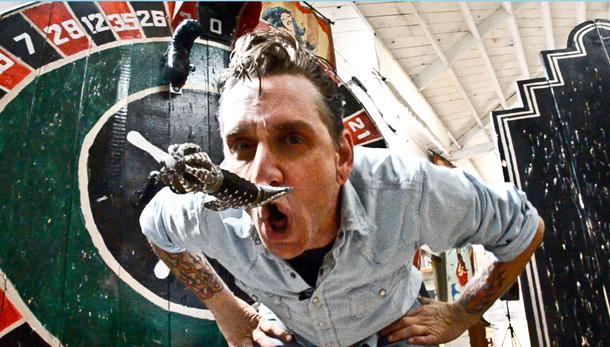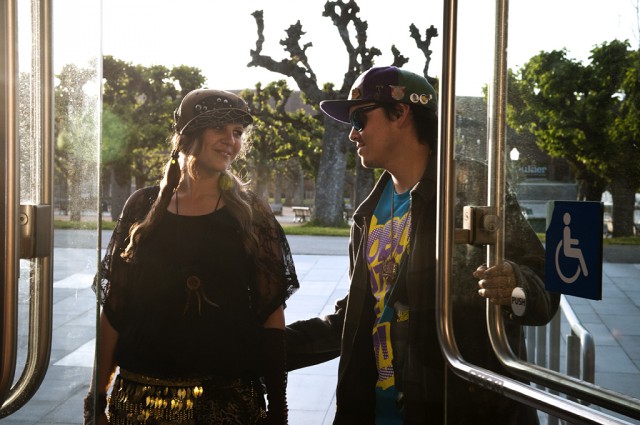
Written by Victor Manuel Rodriguez
Photos by Nelson Estrada
Will Nelson sits at a table and watches the students come in and wait for the day’s lesson to begin. As he pulls up his sleeves, his laid-back hiker’s appearance does not exactly scream professor and revolutionary. As is customary, he greets the students when they come in and jokes with them, displaying a strong sense of rapport from teacher to students — but teacher is an inaccurate title.
Behind Nelson is Kelly Corwin, also one of the teachers of the class. With a marker in hand, he shows his obvious knowledge and effective communication skills — a contrast to the stereotypes anyone might have about long-haired skaters.
This duo is a part of San Francisco State University’s “experimental college.” The college seeks to completely reorganize the ways in which education is taught — in essence, they eliminate the boundaries between teachers and students. Though it might appear as just another group discussion or debate, both Nelson and Corwin view it as a way to expand ground for knowledge.
In this particular class, hands-on lectures and discussions are part of a wider experiment that Nelson and Corwin have had in mind since 2010. They serve as the current frontrunners for the student activism class, which is just one part of the experimental college. This particular class encourages students to become a part of the societal movements they learn from history, take action against the plight of the environment, and address current issues on campus.
“This class is meant to put students on the level of those who teach,” explains Nelson. “As opposed to a hierarchical structure where the teacher has the final say on all lessons, students in this class have the opportunity to teach something new as well as learn.”
Basing their class around the model of the American civil rights movement during the 60s, their analytical view towards the problems of society and heightened political perspectives often put them at odds with the institutions of education.

The inspiration for the establishment of SF State’s experimental college comes from the student strike on campus for an ethnic studies department nearly 46 years ago. The student activism class models itself in the “horizontal” structure, which means that there are no leaders, and the students have more authority than in a normal classroom.
“We started this in response to the American versions of history that were being taught to students,” proclaims Nelson. “If we are not being taught the real thing, then we will teach ourselves.”
Tensions were high during that era because minorities and their histories were underrepresented in the university curriculum. In response, students within the Bay Area school systems began to protest with the hope of establishing ethnic studies courses. The Black Student Union and the Third World Liberation Front are among the strongest groups that came together and eventually made SF State establish the first College of Ethnic Studies. The first versions of an experimental college were developed in other schools around the same time.
“This is also a way of critiquing the system,” says Nelson of how education in recent times falls short of expectations. But as they try to take matters into their own hands, the university refuses to accredit any course within the experimental college.
Since its inception, the experimental college has struggled for recognition for its students. It has had its ups and downs since its resurgence about ten years ago. In trying to receive credit, students must fill out a 699 independent study form, a petition that must have an instructor’s, advisor’s, and a department chair’s signature of approval.
In spite of their efforts, administration is adamant in not letting the experimental college count as a class, seeing it as a violation of academic policy. Administration maintains that there must be a faculty member always present and overlooking the course and the experimental college has some trouble establishing the direct link administration requires, according to Nelson’s experience.
“It gives an opportunity for students to ask and answer to their own questions,” explains Kathy Emery, a political science lecturer at SF State, about why she supports the duo and the concept.
“My experience and my research have convinced me that people learn best when they get to ask the questions and have support in helping them answer their questions,” notes Emery about some of the more crucial points of the experimental college.
Emery, who was a high school teacher for sixteen years and ran a nonprofit summer program for free on six different occasions, offers a very detailed analysis on alternative schools. The research includes important historical examples of education in the American timeline, and how circumstances of current civil unrest propel the notion of students taking matter into their own hands, among many other factors.
Being former students of Emery’s, the guys started the experimental college as a final project for her class in Spring 2010 and carried it over to Fall 2011 under her advisement. They created a syllabus in response to administration requirements and thus the student activism class was born.
Tying back his long, blond hair, Nelson sits at a nearby desk and lets Corwin take the helm for the day’s class. This particular session focuses on a recent meeting with the Deep Green Resistance, an environmental movement on the rise that forms new strategies against those responsible for environmental damage.
Corwin explains that the environmental struggle, in regards to the activism he teaches about, runs deeper than just human rights. The activist ideal seeks to fight for basic human rights and eradicate any discrimination, but not if it will trample the rights of nature.
“Governments only address the tip of the problems,” says Corwin. “Corporations have done so much against nature, where we should be helping and not oppress. You may be doing something, but what you are doing is not enough.”
As the night nears its conclusion, another important topic on the agenda is the upcoming decision on whether or not the SF State campus bookstore will be sold and made for profit. In a chance to put activism in action, the class encourages attending the meetings so as to fight another battle perpetrated by corporate interests.

The teachers encourage students that the key is to boycott and petition in order to promote independence and keep it non-profit.
These efforts may be in vain, as the future of the experimental college at SF State is not certain. While still in the early stages, the concept is groundbreaking and exciting because it is new, yet it can just as easily fizzle out with time as the craze subsides. The guys are hoping to keep experimental college a part of SF State for a long time.
“We hope to expand on critical analysis,” says Nelson. “It is important to preserve the history of the social movement by bringing a modern approach.”
If the experimental college grows, more classes will be offered, thus paving the way for more philosophical perspectives of current events. Students should be able to have access to a ground for deeper awareness and consciousness, Nelson further describes.
“Our experimental college comes from a deep concern for welfare of the people,” says Nelson. “Hopefully, it can inspire people to teach more and be taught by students.”




